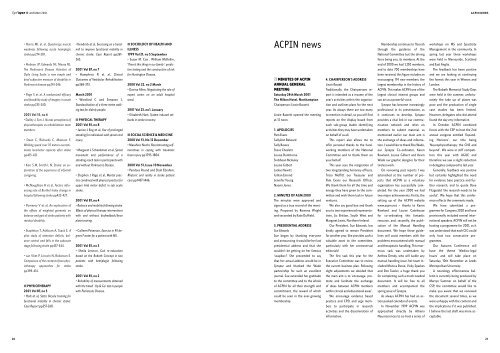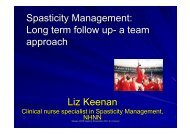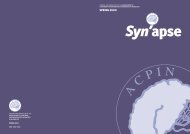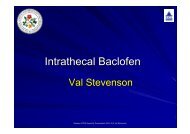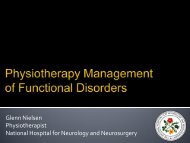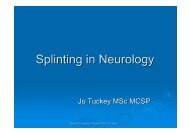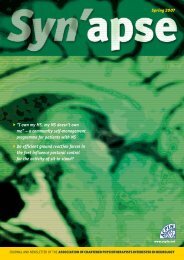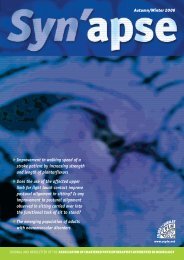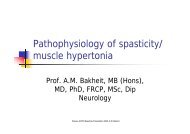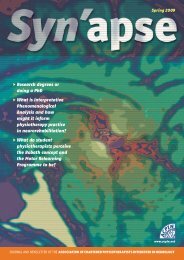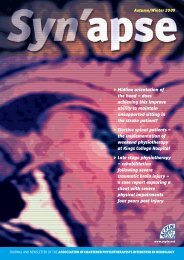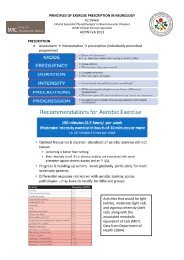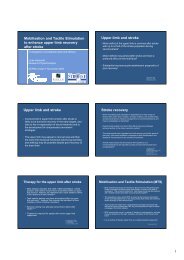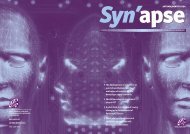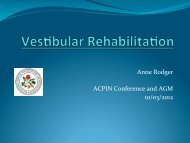SYNAPSE November 2001 - acpin
SYNAPSE November 2001 - acpin
SYNAPSE November 2001 - acpin
You also want an ePaper? Increase the reach of your titles
YUMPU automatically turns print PDFs into web optimized ePapers that Google loves.
Syn’apse ● AUTUMN <strong>2001</strong><br />
ACPIN NEWS<br />
• Harris ML et al, Quadriceps muscle<br />
weakness following acute hemiplegic<br />
stroke pp274-281.<br />
• Hobson JP, Edwards NI, Meara RJ,<br />
The Parkinson’s Disease Activities of<br />
Daily Living Scale: a new simple and<br />
brief subjective measure of disability in<br />
Parkinson’s disease pp241-246.<br />
• Page S et al, A randomized efficacy<br />
and feasibility study of imagery in acute<br />
stroke pp233-240.<br />
<strong>2001</strong> Vol 15, no 4<br />
• Dalley J, Sim J, Nurses perceptions of<br />
physiotherapists as rehabilitation team<br />
members.<br />
• Dean C, Richards C, Malouin F,<br />
Walking speed over 10 metres overestimates<br />
locomotor capacity after stroke<br />
pp415-421.<br />
• Kerr S M, Smith L N, Stroke: an exploration<br />
of the experience of informal<br />
caregiving.<br />
• McNaughton H et al, Factors influencing<br />
rate of Barthel Index change in<br />
hospital following stroke pp422-427.<br />
• Pomeroy V et al, An exploration of<br />
the effects of weighted garments on<br />
balance and gait of stroke patients with<br />
residual disability.<br />
• Stapleton T, Ashburn A, Stack E, A<br />
pilot study of attention deficits, balance<br />
control and falls in the subacute<br />
stage following stroke pp437-444.<br />
• van Vliet P, Lincoln N, Robinson E,<br />
Comparison of the content of two physiotherapy<br />
approaches for stroke<br />
pp398-414.<br />
■ PHYSIOTHERAPY<br />
<strong>2001</strong> Vol 87, no 5<br />
• Holt et al, Static Bicycle training for<br />
functional mobility in chronic stroke:<br />
Case Report pp257-260.<br />
• Kendrick et al, Exercising on a treadmill<br />
to improve functional mobility in<br />
chronic stroke: Case Report pp261-<br />
265.<br />
<strong>2001</strong> Vol 87, no 7<br />
• Humphriss R et al, Clinical<br />
Outcomes of Vestibular Rehabilitation<br />
pp368-373.<br />
March <strong>2001</strong><br />
• Worsford C and Simpson J,<br />
Standardisation of a three metre walking<br />
test for elderly people.<br />
■ PHYSICAL THERAPY<br />
<strong>2001</strong> Vol 81, no 8<br />
• Janice J Eng et al, Use of prolonged<br />
standing for individuals with spinal cord<br />
injury.<br />
• Margaret L Schenkman et al, Spinal<br />
movement and performance of a<br />
standing reach task in participants with<br />
and without Parkinson’s Disease.<br />
• Stephen J Page et al, Mental practice<br />
combined with physical practice for<br />
upper limb motor deficit in sub acute<br />
stroke.<br />
<strong>2001</strong> Vol 81, no 4<br />
• Balance and mobility following stroke.<br />
Effects of physical therapy interventions<br />
with and without biofeedback/force<br />
plate training.<br />
• Colleen Peterson, Exercise in 94 degrees<br />
F water for a patient with MS.<br />
<strong>2001</strong> Vol 81, no 3<br />
• Sheila Lennon, Gait re-education<br />
based on the Bobath Concept in two<br />
patients with hemiplegia following<br />
stroke.<br />
<strong>2001</strong> Vol 81, no 2<br />
• Reliability of measurements obtained<br />
with the timed ‘ Up & Go’ test in people<br />
with Parkinsons Disease.<br />
■ SOCIOLOGY OF HEALTH AND<br />
ILLNESS<br />
1999 Vol 21, no 5 September<br />
• Susan M. Cox , William McKellin,<br />
‘There’s this thing in our family’: predictive<br />
testing and the construction of risk<br />
for Huntington Disease.<br />
2000 Vol 22, no 2 March<br />
• Davina Allen, Negotiating the role of<br />
expert carers on an adult hospital<br />
ward.<br />
<strong>2001</strong> Vol 23, no1, January<br />
• Elizabeth Hart, System induced setbacks<br />
in stroke recovery.<br />
■ SOCIAL SCIENCE & MEDICINE<br />
2000 Vol 51, No 12 December<br />
• Masahiro Nochi, Reconstructing selfnarratives<br />
in coping with traumatic<br />
brain injury pp1795-1804.<br />
2000 Vol 51, Issue 10 <strong>November</strong><br />
• Pandora Pound and Shah Ebrahim,<br />
Rhetoric and reality in stroke patient<br />
care pp1437-1446.<br />
ACPIN news<br />
■N MINUTES OF ACPIN<br />
ANNUAL GENERAL<br />
MEETING<br />
Saturday 24th March <strong>2001</strong><br />
The Hilton Hotel, Northampton<br />
Chairperson: Linzie Bassett<br />
Linzie Bassett opened the meeting<br />
at 12 noon.<br />
1. APOLOGIES<br />
Pam Evans<br />
SallyAnn Belward<br />
Sally Bowes<br />
Steve Cheslett<br />
Louise Dunthorne<br />
Siobhoan McAuley<br />
Louise Gilbert<br />
Jackie Newitt<br />
Gillian Emond<br />
Jennifer Young<br />
Naomi Jones.<br />
2. MINUTES OF AGM 2000<br />
The minutes were approved and<br />
signed as a true record of the meeting.<br />
Proposed by Rowena Wright<br />
and seconded by Kate Duffield.<br />
3. PRESIDENTIAL ADDRESS<br />
Sue Edwards<br />
Sue began by thanking everyone<br />
and announcing it would be her last<br />
presidential address and that she<br />
wouldn’t be getting on her famous<br />
‘soapbox’! She proceeded to say<br />
that her actual address would be in<br />
Synapse and thanked the Wade<br />
partnership for such an excellent<br />
journal. Sue extended her gratitude<br />
to the committee and to the whole<br />
of ACPIN for all their strength and<br />
commitment, the reward of which<br />
could be seen in the ever-growing<br />
membership.<br />
4. CHAIRPERSON’S ADDRESS<br />
Linzie Bassett<br />
Traditionally, the Chairpersons report<br />
is intended as a resume of the<br />
year’s activities within the organisation<br />
and outlines plans for the next<br />
year. As always there are too many<br />
to mention in detail, so you will find<br />
reports on the display board from<br />
each sub-group leader identifying<br />
activities they may have undertaken<br />
on behalf of us all.<br />
This report also allows me to<br />
offer personal thanks to the hardworking<br />
members of the National<br />
Committee and to thank them on<br />
your behalf.<br />
This year sees the resignation of<br />
two longstanding honorary officers,<br />
Tricia Moffitt our Treasurer and<br />
Pam Evans our Research Officer.<br />
We thank them for all the time and<br />
energy they have given to the committee<br />
and wish them luck in future<br />
ventures.<br />
We also say good bye and thank<br />
you to two experienced representatives,<br />
Liz Britton, South West and<br />
Margaret Lewis, Northern Ireland.<br />
Our President, Sue Edwards, has<br />
kindly agreed to remain President<br />
for another year. She provides such a<br />
valuable asset to the committee,<br />
particularly with her controversial<br />
editorials!<br />
The first task this year for the<br />
Executive Committee was to review<br />
the current business plan. Following<br />
slight adjustments we decided that<br />
the main aim is to ‘encourage, promote<br />
and facilitate the exchange<br />
of ideas between ACPIN members<br />
within clinical and educational areas’.<br />
We encourage evidence based<br />
practice and CPD, and urge members<br />
to participate in research<br />
activities and the dissemination of<br />
information.<br />
Membership continues to flourish<br />
through the guidance of the<br />
National Committee but the driving<br />
force being you, its members. At the<br />
end of 2000 we had 1,250 members,<br />
and to date 700 memberships have<br />
been received, this figure includes an<br />
encouraging 174 new members; the<br />
largest membership in the history of<br />
ACPIN. This makes ACPIN one of the<br />
largest clinical interest groups and<br />
can act as a powerful voice.<br />
Synapse has become increasingly<br />
professional in its presentation, as<br />
it continues to develop. Synapse<br />
provides a vital link in our communication<br />
network and relies on<br />
members to submit material, as<br />
mentioned earlier our main aim is<br />
the exchange of ideas and information.<br />
I would like to thank Ros Wade,<br />
our Synapse Co-ordinator, Karen<br />
Rowland, Louise Gilbert and Kevin<br />
Wade our graphic designer for their<br />
tireless work.<br />
On reviewing past reports I was<br />
astonished at the number of projects<br />
that ACPIN as a voluntary<br />
organisation has successfully completed.<br />
For the year 2000 we had<br />
two major achievements: Firstly, the<br />
setting up of the ACPIN website<br />
www.<strong>acpin</strong>.net – thanks to Karen<br />
Rowland and Louise Gatehouse<br />
for co-ordinating this fantastic<br />
resource, and, secondly, the publication<br />
of the Manual Handling<br />
document. We hope these guidelines<br />
will assist members with the<br />
problems encountered with manual<br />
and therapeutic handling. This enormous<br />
task was undertaken by<br />
Anthea Dendy, who will tackle any<br />
manual handling issue, her team included<br />
Monica Busse, Vicky Sparkes<br />
and Dot Tussler, a huge thank you<br />
for completing such a much needed<br />
document. It will be free to all<br />
members and accompanied the<br />
spring issue of Synapse.<br />
As always ACPIN has had an action<br />
packed calendar of events.<br />
In <strong>November</strong> 1999 ACPIN was<br />
approached directly by Athena<br />
Neurosciences to co-host a series of<br />
workshops on MS and Spasticity<br />
Management in the community. In<br />
spring last year three workshops<br />
were held in Merseyside, Scotland<br />
and East Anglia.<br />
The feedback has been positive<br />
and we are looking at continuing<br />
the format this year in Wessex and<br />
London.<br />
The Bobath Memorial Study Days<br />
were held in the summer, unfortunately<br />
the take up of places was<br />
poor and the production of single<br />
case studies has been limited.<br />
However, delegates who did attend<br />
found the day very informative.<br />
In October ACPIN combined<br />
forces with the CSP to host the 2nd<br />
annual congress entitled ‘Expanding<br />
Horizons’, our title being<br />
‘Neurophysiotherapy: the CNS and<br />
beyond’. We were in stiff competition<br />
this year with AGILE and<br />
therefore we saw a slight reduction<br />
in delegates compared to last year.<br />
Generally, feedback was positive<br />
but certainly highlighted the need<br />
for evidence base practice and further<br />
research, and to quote Dave<br />
Fitzgerald ‘the research needs to be<br />
useful’. We hope that this conference<br />
reflects the comments made.<br />
We have submitted a programme<br />
for Congress 2002 and have<br />
provisionally included several international<br />
speakers. ACPIN will not be<br />
hosting a programme for <strong>2001</strong>, as it<br />
was understood that each CIG could<br />
only host two consecutive programmes.<br />
Our Autumn Conference will<br />
have the theme ‘Medico-legal<br />
Issues’ and will take place on<br />
Saturday 10th <strong>November</strong> at Leeds<br />
Metropolitan University.<br />
A neurology effectiveness bulletin<br />
is currently being produced by<br />
Martyn Summer on behalf of the<br />
CSP, the committee would like to<br />
make you aware that we reviewed<br />
the document several times, as we<br />
were unhappy with the content and<br />
the implications if it was published.<br />
I believe the last draft was more acceptable.<br />
20 21


